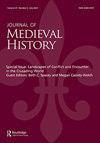Donations, discipline and commemoration. Creating group identity in the transport workers guilds of mid fifteenth-century Riga
IF 0.3
2区 历史学
0 MEDIEVAL & RENAISSANCE STUDIES
引用次数: 0
Abstract
ABSTRACT This article focuses on the process of creating group identity in two transport workers’ guilds in mid fifteenth-century Riga, demonstrating the role of donations, discipline and commemoration in constituting both groups. The Beer Carters’ and Porters’ guilds experienced a ‘new beginning’ at this time: new resources had to be attracted, new traditions created and internal hierarchies established. Donations were an important element that helped these groups to establish their own spaces of piety – to create altars and chapels – and also to acquire resources for the celebration of communal meals. At both liturgical services and communal meals groups commemorated their deceased members, thus strengthening their identities. In the Hanseatic cities there was a bond between transport workers and merchants; in Riga as well, merchants became members of the two guilds, became involved in the processes of creating group identity, made endowments and helped the guilds gain status.捐赠、纪律和纪念。在十五世纪中期里加的运输工人工会中创造群体身份
本文关注15世纪中期里加两个运输工人行会群体认同的形成过程,展示了捐赠、纪律和纪念在这两个群体的形成过程中所起的作用。此时,啤酒搬运工公会经历了一个“新的开始”:必须吸引新的资源,创造新的传统,建立内部等级制度。捐赠是帮助这些团体建立自己的虔诚空间的一个重要因素——建立祭坛和教堂——也为庆祝公共膳食获得资源。在礼拜仪式和公共膳食中,团体纪念他们死去的成员,从而加强他们的身份。在汉萨同盟城市,运输工人和商人之间有一种联系;在里加也是如此,商人成为两个行会的成员,参与创建群体身份的过程,捐赠并帮助行会获得地位。
本文章由计算机程序翻译,如有差异,请以英文原文为准。
求助全文
约1分钟内获得全文
求助全文
来源期刊

JOURNAL OF MEDIEVAL HISTORY
MEDIEVAL & RENAISSANCE STUDIES-
CiteScore
0.60
自引率
0.00%
发文量
29
期刊介绍:
The Journal of Medieval History aims at meeting the need for a major international publication devoted to all aspects of the history of Europe in the Middle Ages. Each issue comprises around four or five articles on European history, including Britain and Ireland, between the fall of Rome and the Renaissance. The Journal also includes review articles, historiographical essays and state of research studies.
 求助内容:
求助内容: 应助结果提醒方式:
应助结果提醒方式:


